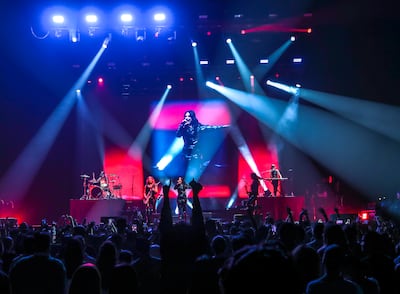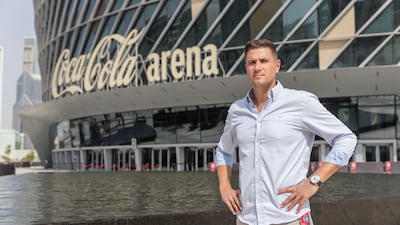Our Working Wonders of the UAE series takes you to some of the country's most recognisable destinations to uncover the daily duties of the talented employees working there
Mark Jan Kar had aspirations of a sporting career before life led to him eventually becoming general manager of Dubai’s Coca-Cola Arena in May 2021.
He has since helped steer major live acts and shows to the City Walk venue, while balancing his personal role as a father of two.
Born in New Zealand to Polish parents, Mr Jan Kar, 41, initially joined as commercial director five years ago having previously worked in strategic partnerships with big sports and entertainment names and on multi-million-dollar sponsorship deals while developing events in Saudi Arabia, including what became LIV Golf.
Before that, Mr Jan Kar worked with a multimedia sports information platform and a sports and fitness distributor.
Here, he invites The National backstage to learn about how he and his team put on some of the biggest shows in Dubai.
What was your childhood ambition?
To become a professional tennis player.
I played at a very high level but just before my 16th birthday I sat down with my father after a horrific loss early in a tournament.
He said: “You're good, but you're never going to be that good. So either double down, be prepared to live out of motels and camper vans and play on the satellite tour, maybe you get a lucky break – or concentrate at school.”
It took me a while to get over what he said, but the business of sport was the ambition coming out of university.
Was it tough becoming GM during a pandemic?
Although UAE borders were open, the rest of the world was pretty much still in lockdown.
I often joke that they had no one else, and someone said 'we might as well give Mark a go until these borders open'.
I felt like an impostor for probably a year, and then I realised, 'oh wow, I can actually do this'.
I was part of the opening of the building and then the programming. To have an opportunity to reopen a building (as the boss) … no one knew what was going to happen.
Are you part of a larger mission?
We may work for an organisation, but ultimately it’s about the brand reputation of Dubai.
I feel fortunate to be part of a situation where I call the tourism heads friends, and we strategically discuss content coming through the building that affects change and brings business to hoteliers.
What does your role involve?
About 40 per cent is programming, which includes everything from understanding potential artists that could play in Dubai or world tour discussions.
I'm on calls with the US and UK every two days, and the Australian team. Then there's the negotiations and contracting.
Around 20 per cent is working with the executive team, understanding pain points and how we drive commercial revenue outside of event days and on event nights, such as food and beverage programmes.
The balance is dealing with stakeholders, end-of-month reporting and financial planning.
Dubai is constantly moving, so there's networking – which brands we want to be associated with and what strategies the tourism board is developing.
ASM Global (which operates the arena) has 370 venues around the world. I'm fortunate that I'm able to travel and see some amazing shows and venues, consistently looking at new and different ways we can potentially bring, from a customer service or tech perspective, or an artist.
Do artist fees challenge ticket affordability?
For us, the average entry ticket point is Dh199 – that's my magic number. Some venues across the country charge entry prices at Dh299, or even Dh399.
The biggest pain is artist fee expectations. It's mind-blowing. Through networking and relationships we have direct access, but nowadays it's: “Unless you're paying me a million dollars, I won't even have a conversation.”
We negotiate artist fees by making an offer and the artist's management indicate minimum fees that would make it commercially viable.
We have received minimum fee suggestions that we have respectfully turned down as the economics don't make sense.
How do you see your role?
A bit like a football manager. Your backroom staff need to be as strong, you’re there to lead by example, but not do it for them.
It’s about identifying key talents and playing them in the right position and working as a team to achieve something – and that achievement coming out of Covid was getting as many shows through the building as possible, to get the industry going. I needed to put results on the board early.
I’m not afraid to talk to anyone. If someone says “no” and they don’t give me a valid reason, I will build a business case.
How do you pick successful shows?
That's the challenge. We're fortunate in the UAE that we have multiple nationalities so you're not restricted to two or three concert genres.
I probably now know about 150 artists across the South-East Asian market by name, by skillset, how many times they come to Dubai, because that’s my job. It’s about consistently learning.

It sounds glamorous that we work in entertainment and music but the reality is that you get 30 seconds with the artist as they're there to perform.
You hear stories about people proposing at a particular concert and everyone remembers their first concert … so it’s about curating those moments and explaining that to your network: “This is why we want to do these things.”
Any curious artist requests?
Two [backstage] riders stand out – a specific cleaning product to be used to wipe down artist dressing rooms and a quantity of tissues removed from a box and folded in a particular way.
Do big shows bring bigger challenges?
We’re very fortunate the infrastructure is here.
Within a 5km radius, I've got 15,000 hotel rooms, the logistics, transportation, and you're 20 minutes from the airport. We work with the Roads and Transport Authority.
An Afrobeats artist missed his connecting flight through Qatar, but he landed here at 7.30pm and was on stage by 9.30pm, because everything works.
Do successful shows make you smile?
There are different phases. You've done the contract, so you're excited. The second phase is the announcement and initial response. Then comes artists arriving in the country. Once they land, once in the venue, you can breathe a little easier.
At the end of the night when the artist announces the last song, that's when I take a second and go 'whoa'. There is satisfaction.
One of my favourite parts is joining the team for a nightcap once everyone's out the door. We've got beautiful views of the Burj Khalifa, what we call 'the secret garden', and everyone just de-stresses.
Do you have a wishlist?
I want to get a sports franchise team that calls Dubai home, and I've got a couple of major acts I'd love to see in the building.
This is personal, not a 'hint, hint, nudge nudge' but I'd love to get Metallica, and big hip-hop acts like Snoop Dogg, P Diddy or Chris Brown. And a country artist.










